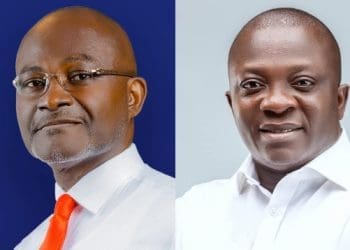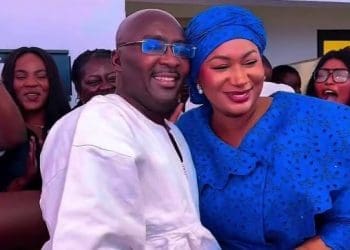The Supreme Court of Ghana has delivered a decisive legal victory to Charles Cromwell Nanabanyin Onuawonto Bissue, former Secretary to the Inter-Ministerial Committee on Illegal Mining (IMCIM), by overturning a High Court ruling that had favoured the Office of the Special Prosecutor (OSP).
In a judgment delivered on Tuesday, June 3, the apex court granted a writ of certiorari filed by Mr. Bissue, effectively nullifying the High Court’s decision and prohibiting the trial judge from presiding over any further proceedings involving the case.
The ruling not only halts the immediate prosecution of Mr. Bissue before the judge in question but also raises new questions about procedural fairness and the conduct of the OSP in high-profile corruption cases.
Supreme Court finds flaws in high court proceedings
Mr. Bissue’s legal team, led by the firm Sarkodie Baffour Awuah & Partners and argued by Theresa Tabi, had filed the certiorari application on grounds that the High Court had failed to consider critical video evidence submitted by the defence.
The video, reportedly central to the Applicant’s case, had been ignored by the court despite payment for video conferencing facilities and a formal request to review it.
The case stems from a controversial 2023 episode in which the OSP announced that it had secured an arrest warrant for Mr. Bissue and issued a widely circulated “wanted notice.”
However, a legal search by Mr. Bissue’s team revealed that no such warrant existed.
His lawyers subsequently filed an ex parte motion to injunct the OSP from enforcing the purported warrant—an application which was granted.
Nonetheless, the High Court proceeded to hear the matter, setting down trial procedures without viewing the submitted evidence.
The court dismissed the case brought by Mr. Bissue, clearing the way for criminal proceedings initiated by the OSP. It was this ruling that has now been quashed by the Supreme Court.
OSP charges rooted in Anas’ 2019 documentary
The OSP’s case against Mr. Bissue originated from a 2019 undercover investigative documentary by journalist Anas Aremeyaw Anas and his Tiger Eye P.I. team.
The exposé alleged that Mr. Bissue, while serving as IMCIM Secretary, accepted bribes to fast-track mining license approvals, bypassing due diligence processes designed to combat illegal small-scale mining, or galamsey.
According to the OSP, between January and February 2019, Mr. Bissue received GH₵35,000 in three separate payments from one Benjamin Adjapong, posing as a representative of ORR Resources Enterprise.
The funds— GH₵15,000 on January 22, GH₵10,000 on January 30, and another GHC10,000 on February 8—were allegedly meant to facilitate the renewal of an expired mining license.
Charges filed against Mr. Bissue include using public office for profit under Section 179C(a) of the Criminal Offences Act, 1960 (Act 29)
Corruption by a public officer under Sections 239(1) and (3) of Act 29, as amended by Act 1034
The OSP also alleged that the bribe scheme reflected a broader pattern of collusion between public officials and private agents to circumvent established licensing protocols in Ghana’s artisanal mining sector.
Alleged intermediary also indicted
Alongside Mr. Bissue, the OSP also charged Andy Thomas Owusu, described as an intermediary in the alleged bribery scheme. Mr. Owusu was accused of facilitating communication between ORR Resources and Mr. Bissue, and of helping to negotiate a bribe that was initially pegged at GH₵100,000 but later reduced to GH₵40,000 each for himself and Mr. Bissue.
The prosecution claims Mr. Owusu received GH₵5,000 in Kumasi as a first installment and ultimately retained GH₵15,000 from the deal.
He faces multiple charges, including aiding and abetting the use of public office for profit under Section 179C (b), corruption of a public officer and accepting bribes to influence a public officer’s duties under Sections 239(2) and 252(1)
OSP’s strategy under pressure
While the Supreme Court ruling does not exonerate Mr. Bissue of the corruption charges brought against him, it significantly alters the procedural trajectory of the case.
Legal analysts say the prohibition placed on the trial judge may compel the OSP to either reassign the case or revise its approach entirely.
Observers suggest the ruling will influence the way future cases are pursued by the OSP, particularly those involving claims of judicial bias, flawed procedure, or improper use of prosecutorial authority.
It may also embolden other defendants to challenge the procedural integrity of cases brought by the powerful anti-graft body.
Mr. Bissue’s legal team is expected to explore additional legal avenues, including potentially contesting the substantive corruption charges and the legitimacy of the investigation itself.
The Office of the Special Prosecutor has yet to issue a public response to the Supreme Court’s decision.
IMCIM and the battle against galamsey
The Inter-Ministerial Committee on Illegal Mining (IMCIM) was created in 2017 as part of a government crackdown on illegal small-scale mining, a practice linked to widespread environmental degradation and water pollution across Ghana.
The committee’s mandate included the screening and approval of mining licenses, as well as the enforcement of environmental regulations.
As Secretary to the IMCIM, Mr. Bissue played a central role in implementing these directives.
His 2019 resignation came on the heels of the Anas documentary, which triggered widespread public outrage and led to calls for reform within the mining regulatory framework.
Mr. Bissue has consistently maintained his innocence, describing the accusations and accompanying video footage as misleading and politically motivated.













